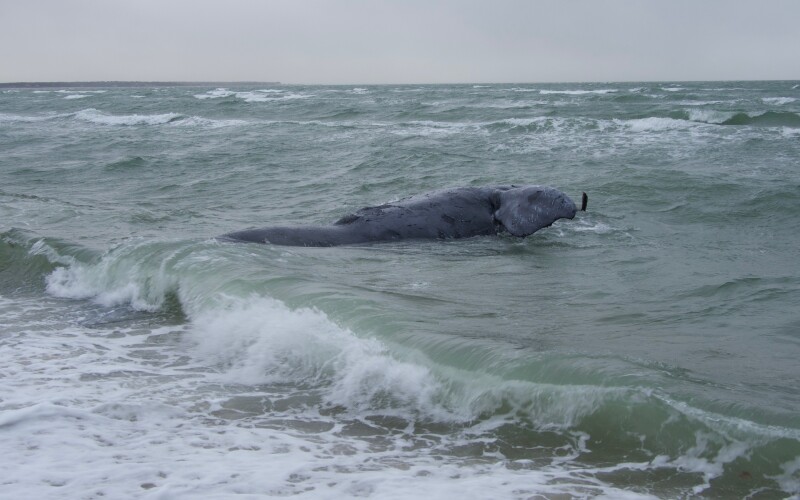A dead North Atlantic right whale that washed up at Martha’s Vineyard was identified as a 3-year-old female that was first seen entangled in the Gulf of St. Lawrence off Canada in 2022, according to scientists at the New England Aquarium.
First observed by researchers as a calf in 2021, the young whale was dubbed #5120 in a catalog maintained by the aquarium and other whale tracking groups. In August 2022 #5120 was sighted again, entangled in fishing gear in the Gulf of St. Lawrence.
“Multiple attempts were made to disentangle the whale in January and February of 2023 off Cape Cod,” according to a summary issued by the New England Aquarium. “She was resighted still entangled in June 2023 in the Gulf of St. Lawrence, with her overall body condition declining as the rope constricted around her tail had become more deeply embedded.”
Researchers and the National Oceanic and Atmospheric Administration track right whales during their seasonal movements in the northwest Atlantic, ranging from Canada south to George and Florida. Photographic data from the North Atlantic Right Whale Catalog allowed aquarium scientists to identify the whale.
NOAA Fisheries was alerted to the dead whale when it appeared Jan. 28 near Joseph Sylvia State Beach on Martha’s Vineyard, where the Wampanoag Tribe of Gay Head (Aquinnah) and the International Fund for Animal Welfare secured the whale on the beach, pending necropsy to determine the cause of death.
Massachusetts law enforcement officers collected a section of rope what was still entangled around and embedded in the whale’s tail, turning it over to NOAA’s Office of Law Enforcement.
Fishing gear entanglement and ship strikes are leading causes of human-caused losses to the highly endangered right whale population, now estimated at fewer than 360 animals and only 70 breeding adult females.
“About 86 percent of right whales have been entangled at least once, some as many as nine times,” according to the New England Aquarium. To reduce vertical lines that can entangle whales, NOAA Fisheries experts are working with New England lobster fishermen to test “on-demand” gear, also called ropeless or pop-up systems, that use remote-controlled buoys that float to the surface when fishermen arrive to retrieve traps.
“This case highlights the ongoing threat right whales and other whale species have been facing from fishing gear entanglements for decades. Prevention of these entanglements needs to be a priority that our society should support. Technological advances that would allow fishing without an endline in the water column—on-demand fishing gear—have come a long way, and implementation of on-demand gear broadly into fisheries is a critical step needed to save this species and to allow fishing to continue,” said Amy Knowlton, a senior scientist in the Anderson Cabot Center for Ocean Life at the New England Aquarium.








